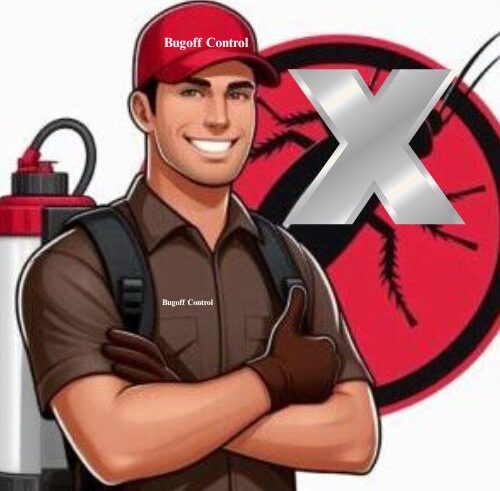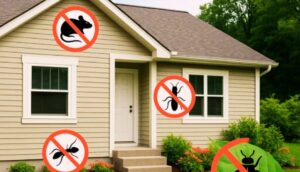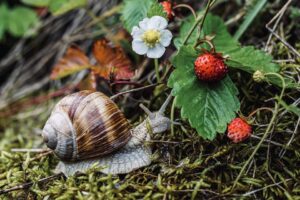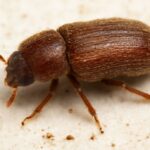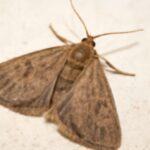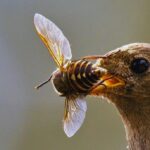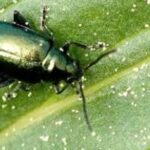How to Control Garden Pest with Baking Soda

Baking soda is a natural and safe product gardeners use to fight insect pests. Baking soda can even be used as a fungicide to control powdery mildew. However, while baking soda may not be the cure-all solution in the control of all pest species and garden disease it is a safer approach to avoid the contamination of food crops by the application of harmful pesticides. If you have been looking for a safe way to control garden pests without the use of harmful pesticides then baking soda will at least solve some of your garden issues. For more on baking soda and its effectiveness in the garden continue reading.
Tips for using Baking Soda in the Garden
1. Snails
Snails and slugs are known to damage garden plants and when seriously infested their feeding can reduce plants, in some cases the entire plant ( soft/herbaceous) will be eaten. Although snails are nocturnal they can also be seen during the day. Once you come in contact with slugs or snails pour a pinch of baking soda on them. The baking soda will cause the snail and slugs to dry out. If the snail is inside of the shell still go ahead and apply a pinch of baking soda in the shell which will reach the snail eliminating them. If you’re planning on searching for snails in your garden at night then make sure to carry a flight light to help locate snails and slugs.
2. Ants
Ants are busy little critters that are always on the go foraging for food or seeking out the right location to establish a colony, like other garden pests ants loves to venture in to garden areas. There presence can disrupt a plants roots system, they will gnaw on stems and encourage the presence of other insect pests and will go as far as using seedlings as a food source. The solution, mix equal parts baking soda and salt, sprinkle this mixture where ants are heavily concentered. The baking soda will neutralize the acids in the ants digestive system causing elimination.
3. Cabbage Worms
Cabbage worms are a common pests to vegetable gardens causing sever damage, they are about 1 inch long. The bodies of cabbage worms are light green with a yellow strip that is faint. This yellow strip that run down the sides of their body helps them to become camouflages, their damage is cause by chewing holes in the leaves. Create a mixture of equal parts flour and baking soda, with this mixture dust kale, broccoli, cabbage, cauliflower, brussels sprouts, radishes and other brassicas. This mixture will not only repel cabbage worms but will eliminate them.
4. Hornworms
Hornworms are green with white diagonal stripes, these worms have a huge appetite and can consume plants quickly, and effective way to bring control is try and locate the eggs on the leaves underside. The eggs can be seen in clusters, sprinkling backing soda on these worms will bring elimination even the eggs will be elimanate when coming in contact with baking soda.
5. Cockroaches
Cockroaches are disease carrying insects letting of a foul odor that’s sickening. Cockroaches love places that are damp and dark, what makes their presence worse is if they are not dealt with immediately can multiply quickly. A natural way to bring control is to mix 2 tablespoons of granulated sugar with 2 tablespoons of baking soda then add some warm water to make a paste. The paste can be place in paper plates, paper cups or bottle caps and place in areas where roaches past or are known to congregate. Once ingested will kill roaches.
6. Silverfish
Silverfish are tiny sliver insects that moves very swiftly, these insects can be found in book shelves and other places that are clutter, silverfish will consume clothes, books, dry foods, plants, wallpaper, soap etc..
Outdoors silver fish loves damp moist conditions hiding, in debris, and under rocks, leaf mold, and barks. With the help of a flour sifter apply baking soda around garden plants an on paths (garden soil) where silverfish are seen. however when applying baking soda make sure to keep this product a few inches from the stems and the lower leaves for effectiveness. The application of baking soda will dry out damp areas that will discourage the presence of silverfish.
Baking Soda to Control Powdery Mildew
While some may differ, a study was done and it was discovered that baking soda is effective in the control of powdery mildew, this method of control works by mixing 1 tablespoon of baking soda in a gallon of water. Add 1 teaspoon of lightweight horticulture oil or insecticidal soap to act as a spread sticker for the solution. Spray your garden plants at the first sign of powdery mildew. Repeat every 7 to 10 days throughout the growing season.
Deter Rabbits with Baking Soda
Rabbits are considered to be some of the most cuteness and adorable mammals that pay home gardens a visit but as cute as they may be when it comes to our prized flower beds and crops that they feast on is not cute at all. To keep rabbits at bay sprinkle or create a circle or barrier around your flower beds and other favorite plants that rabbits are know to use as a food source. This will discourage rabbits from your garden because they hate the taste. Reapplication is need in case of rainfall.
10 Frequently Asked Questions (FAQs)
1. Can I really use baking soda in my garden?
Yes, you can! Baking soda is a simple, natural product that gardeners use to help control fungus, repel pests, and even sweeten tomatoes. It’s safe, affordable, and easy to find.
2. What garden benefits from baking soda?
Baking soda can help with powdery mildew, black spot on roses, and some garden insect pests. It also helps reduce soil acidity slightly, which some plants appreciate.
3. How do I make a baking soda spray for plants?
Mix 1 tablespoon of baking soda, 1 teaspoon of mild dish soap, and 1 gallon of water. Shake it well and spray the mixture onto affected leaves to fight fungal issues like powdery mildew.
4. Is baking soda safe for all plants?
Not quite. While it’s gentle, some plants can be sensitive, especially if the spray is too strong. Always test a small area first and avoid overusing it, especially on delicate leaves.
5. Can baking soda be used to kill weeds?
Yes, it can! Sprinkle baking soda directly onto weeds growing in cracks or walkways. It won’t harm your soil long-term, but it’s best for spot treatments—not for use directly in flower beds.
6. Does baking soda really make tomatoes sweeter?
Many gardeners say yes! Sprinkling a little baking soda around the base of tomato plants may reduce soil acidity, leading to a sweeter flavor. Just use sparingly so you don’t upset the soil balance.
7. Can I use baking soda to clean garden tools and pots?
Absolutely. Baking soda makes a great non-toxic scrub for cleaning clay pots, tools, and even birdbaths. Mix it with water to form a paste and scrub away grime without harsh chemicals.
8. Will baking soda get rid of pests?
It won’t kill bugs like an insecticide, but baking soda can deter some pests like ants and roaches when sprinkled in dry areas. For plants, use it more for fungi than insects.
9. How often should I spray baking soda on plants?
Use baking soda spray once a week if you’re treating a fungal issue. Avoid using it during hot, sunny weather to prevent leaf burn. Always reapply after heavy rain.
10. Is it safe to add backing soda to compost?
It’s not recommended. Baking soda is alkaline and can slow down the process of composting by disrupting the balance of microbes. It’s better used directly in the garden.
Conclusion
Baking soda has its many uses in the garden, this natural pesticides is safe to use in the control of garden pests but as said earlier baking soda is not a cure all for garden pest but this natural product has shown its effective on several insect pest species. So if you haven’t but is looking for a way to bring natural control to listed pests then baking soda may be just for you as you bring control to you pests issues
